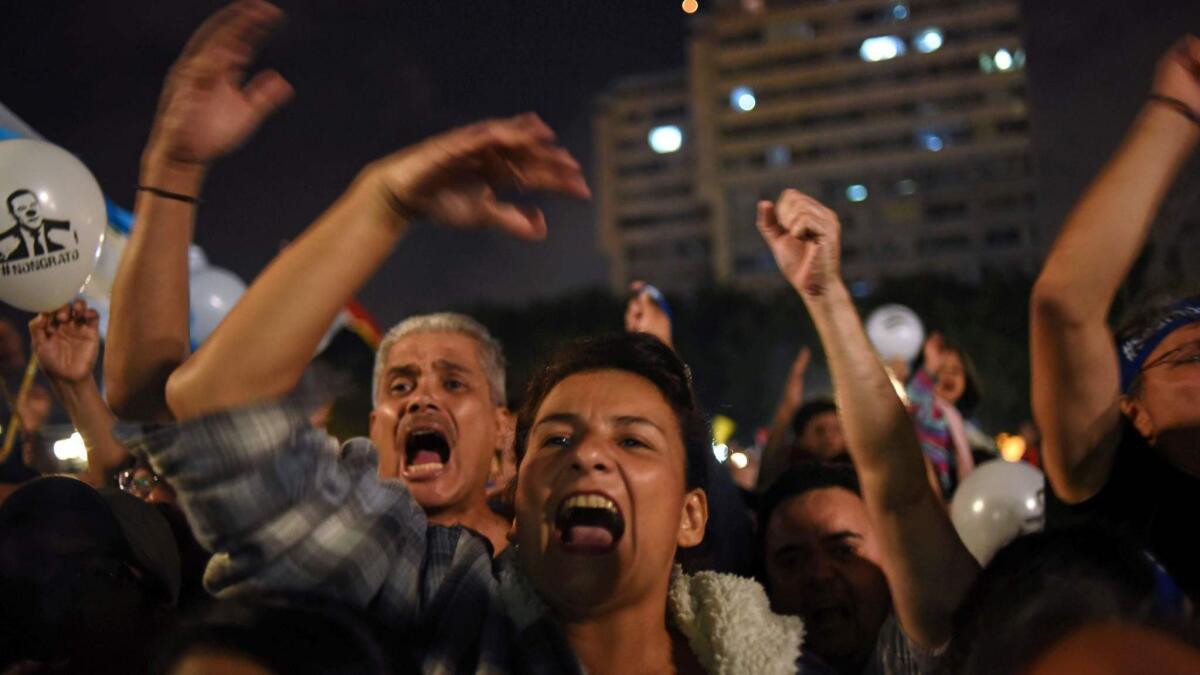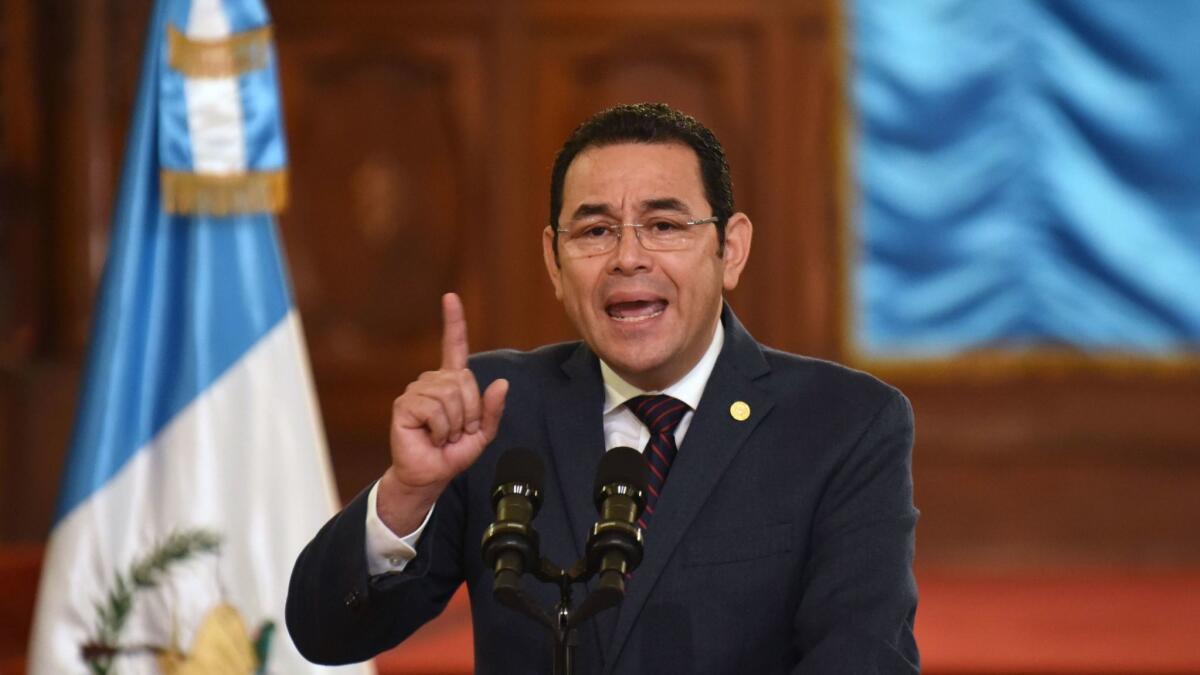‘Resign!’: Protests against Jimmy Morales mount in Guatemala amid constitutional crisis

- Share via
Reporting from Guatemala City — Protesters shouted “Corrupt!” and “Resign!” last week as Guatemalan President Jimmy Morales began a ceremonial speech on the eve of his Central American nation’s independence day.
The protests outside the national palace were the latest to rock the administration of Morales, a key U.S. ally in the region.
Morales’ vows to shut down an internationally backed anti-corruption panel have sparked a constitutional crisis and demonstrations across the country.
The heightened presence of soldiers in the streets as protests mount has recalled, for some, dark memories of past military governments in a nation still haunted by a decades-long civil war that formally ended in 1996.
After three decades, a Guatemalan village ravaged by war brings home its dead »
The constitutional standoff pits Morales against supporters of the International Commission Against Impunity in Guatemala, as the anti-corruption body is known.
The commission — which played a key role in the resignation and arrest of Morales’ predecessor -- has been investigating reports of illegal campaign financing against Morales.

The country’s Constitutional Court is deliberating the legality of Morales’ efforts to shut down the panel. But a ruling may not resolve the crisis, as calls for Morales to step down increase.
“Guatemala is agonizing,” said Blanca Juarez, one of a group of market vendors who made a 130-mile journey to the capital last week to participate in a protest march. “He [Morales] should resign,” Juarez added, raising her voice to be heard above the din of demonstrators pouring into the central plaza.
Morales has denied any wrongdoing and has not commented directly on recent calls for his resignation.
A former television comedian, Morales was elected in 2015. The idea of a political outsider resonated with many Guatemalans heading to polling stations mere days after incumbent President Otto Perez Molina resigned and was arrested on corruption charges.
Perez Molina, a former head of military intelligence, remains jailed pending his trial.
Morales began his four-year term in January 2016. The constitution prohibits presidential reelection, so he cannot be on the ballot in next year’s elections.
The International Commission Against Impunity in Guatemala played a crucial role in bringing down the Perez Molina administration. The United Nations-backed commission has been working alongside Guatemalan prosecutors since 2007, successfully building cases against high-level officials, judges and corporate executives.
Morales was initially supportive of the anti-corruption body, vowing to renew its two-year mandate so that it could continue throughout his presidency and beyond.
The relationship quickly began to sour, however, as Morales, his relatives and his political party all became subjects of investigations into corruption, including illegal campaign financing.
Last year, Morales declared the panel’s head commissioner, Ivan Velasquez, a former judge from Colombia, persona non grata. A ruling by the Constitutional Court, which has the last word on all constitutional matters, reversed the move.
This year, Morales extended his offensive against the anti-corruption panel. On Aug. 31, he announced the non-renewal of the commission’s current mandate, which ends in September 2019, four months before Morales’ term is up. Four days later, the government announced that Velasquez, the head commissioner, was a security threat and would not be permitted back into the country.
Banning Velasquez violates the 2017 court ruling in support of the commissioner, according to Jordan Rodas, the country’s human rights ombudsman, who is challenging Morales’ moves in court. The ombudsman’s action is one of several legal petitions aimed at ensuring the continued presence of both the commission and its chief. A ruling is expected any day.
For the past two weeks, Morales has been insinuating he will disregard an unfavorable ruling from the high court — a move that could exacerbate the constitutional crisis.
The United Nations, Canada and the European Union rallied behind the anti-corruption commission and issued statements lamenting Morales’ actions, but the Trump administration’s response has been tepid.
Morales is an important U.S. ally in the region and beyond. Guatemala supported Washington’s controversial recognition of Jerusalem as the capital of Israel, a move welcomed by the Israeli government but denounced by Palestinian representatives. Guatemala moved its Israeli embassy to Jerusalem in May, the same month as the United States.
Also in May, Sen. Marco Rubio, R-Fla., moved to freeze $6 million in U.S. funding for the anti-corruption commission, contending that the panel was being manipulated. The funds were unfrozen last month.
Washington has been the anti-corruption panel’s largest funder, providing more than a quarter of the commission’s $167 million total budget from 2007 to the present. But the U.S. position in the current crisis remains unclear, given Washington’s strong support for Morales.
Morales has publicly portrayed the anti-corruption commission as a threat. “No state or international body can undermine our sovereignty or threaten our peace, our security and our governance,” Morales said Saturday in his independence day message.
But many Guatemalans see a threat in the increased military presence on the streets since Aug. 31, when Morales moved to shut down the anti-corruption panel. The president has strong support from hard-line, right-wing factions of the military, which remains a powerful force in Guatemala, despite a history of human rights violations.
“They want to re-militarize the country,” said Feliciana Macario, a leader of an organization of women whose husbands were killed during Guatemala’s civil war. “The government is trying to intimidate the civilian population.”
State forces carried out acts of genocide during the 36-year internal armed conflict that ended in 1996, according to a U.N.-backed truth commission. An estimated 200,000 civilians – most of them of indigenous Maya ancestry– were killed.
Throughout Guatemala last week, independence day marches were riddled with protest signs and banners supporting the anti-corruption commission and calling for Morales’ resignation.
More protests across the country are planned for this week.
Cuffe is a special correspondent. Staff writer Patrick J. McDonnell in Mexico City contributed to this report.
Twitter: @PmcdonnellLAT
More to Read
Sign up for Essential California
The most important California stories and recommendations in your inbox every morning.
You may occasionally receive promotional content from the Los Angeles Times.













